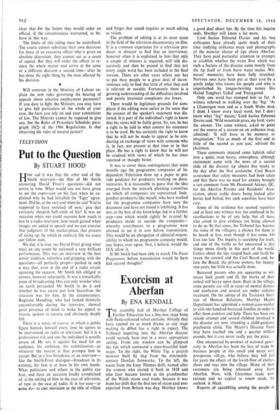Put to the Question
TELEVISION
By STUART HOOD
We did, it is true, see David Frost giving what must on any count be reckoned a very brilliant performance. This was an interview in the best terrier tradition, relentless and gripping, with the questions—all perfectly proper—pushed in such a way that, even at the end of a radio circuit spanning the equator, Mr Smith felt obliged to answer, however reluctantly. It was a remarkable piece of broadcasting. One can only wonder what on earth persuaded Mr Smith to do it and whether he was aware just how hazardous the situation was for him. In the circumstances, Reginald Maudling, who had looked distinctly uncomfortable during the interview, showed great presence of mind to make his appeal to reason, spoken to camera and obviously deeply felt.
There is a sense, of course, in which a public figure hazards himself every time he agrees to be interviewed on radio or television; but it is a professional risk and one the individual is usually aware of. He sets it against his need for an audience, his ambition, his exhibitionism—or whatever the motive is that prompts him to accept. But in a live broadcast, or an interview— like the Smith-Frost dialogue—broadcast in its entirety, his fate is at least in his own hands. What politicians and others in the public eye fear, and have on occasion loudly complained of, is the editing of film in the case of television, of tape in the case of radio. It is too easy—as some do—to cast television in the role of villain and forget that sound requires as much editing as vision.
The problem of editing is at its most acute in the field of the television documentary on film. It is a common experience for a television pro- ducer or director to find that an interviewee, however often it is explained to him that only a couple of minutes is required, will talk dis- cursively and then be pained to find that not every single word has been included in the final version. There are other cases where one has to put busy people to a great deal of incon- venience only to find that little of what they said is relevant or useable. Fortunately there is a growing understanding of the difficulties involved and purely irrational complaints are fewer.
There would be legitimate grounds for com- plaint if the editing were unfair in the sense that the essence of the speaker's statement was dis- torted. It is part of the individual's right to know that his views will be fairly given. So, too, he has a right to be told in what context his statement is to be used. He has certainly the right to know that he will not be made to appear to be con- ducting an exchange of views with someone who is, in fact, not present at that time or in that place. He has a right to know that he will not be credited with views of which he has since repented or thought better.
It was to cover these contingencies that some months ago the programme companies of In- dependent Television drew up a paper to pro- vide guidance for producers working on docu- mentaries. It is reasonable to guess that the idea emerged from the network planning committee on which all companies are represented. Inde- pendent producers, like myself, who have worked for the programme companies have seen the document and have not found it inhibiting. It has not, to the best of my knowledge, led to a further step—one which would rightly be resisted by producers inside or outside the companies— whereby contributors to a programme were allowed to see it in toto before transmission. This would be an abrogation of editorial respon- sibility to which no programme company would, one hopes, ever agree. Nor, I believe, would the ITA allow it.
If Mr Smith had been able to watch The Frost Programme before transmission would he have had second thoughts?






























 Previous page
Previous page